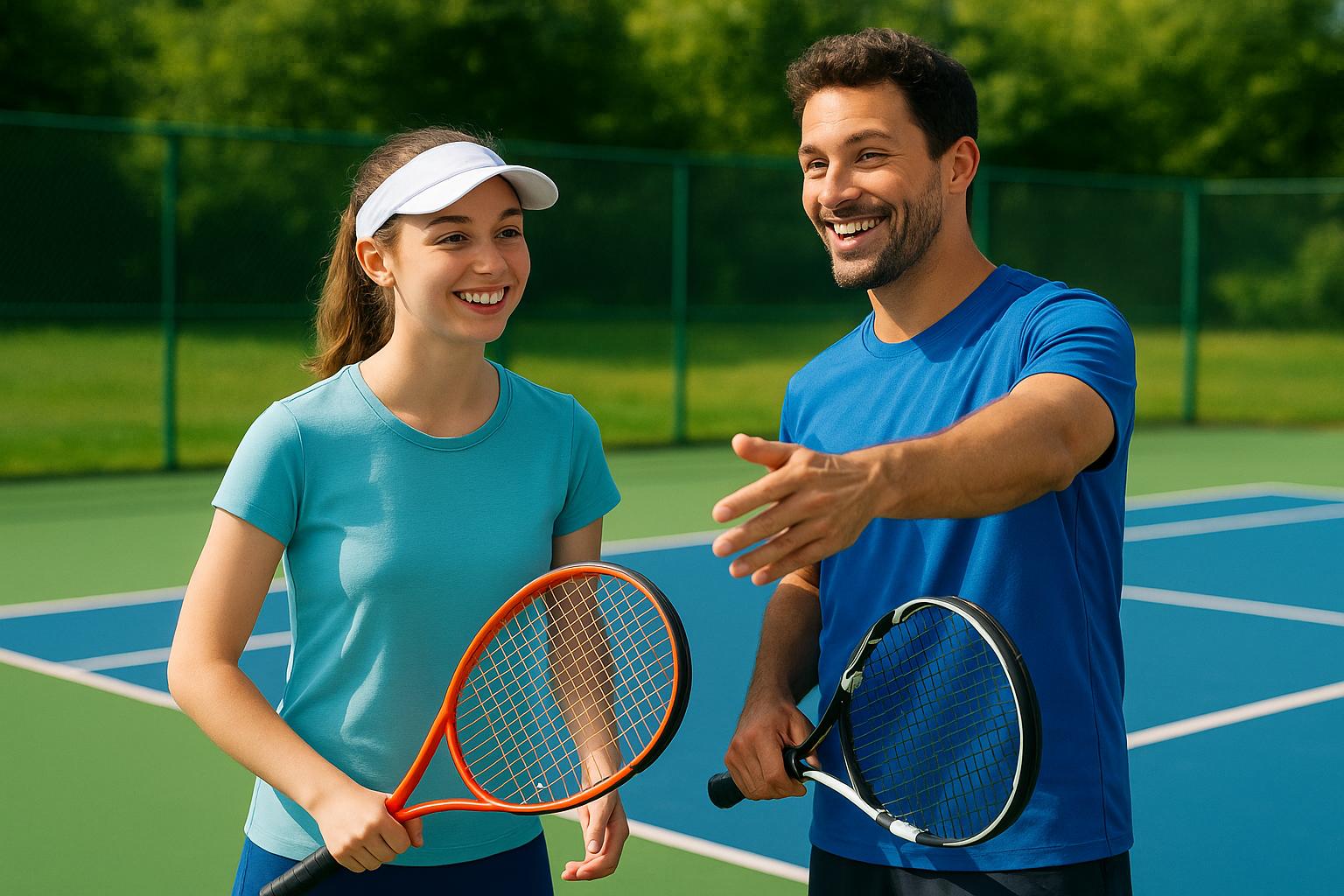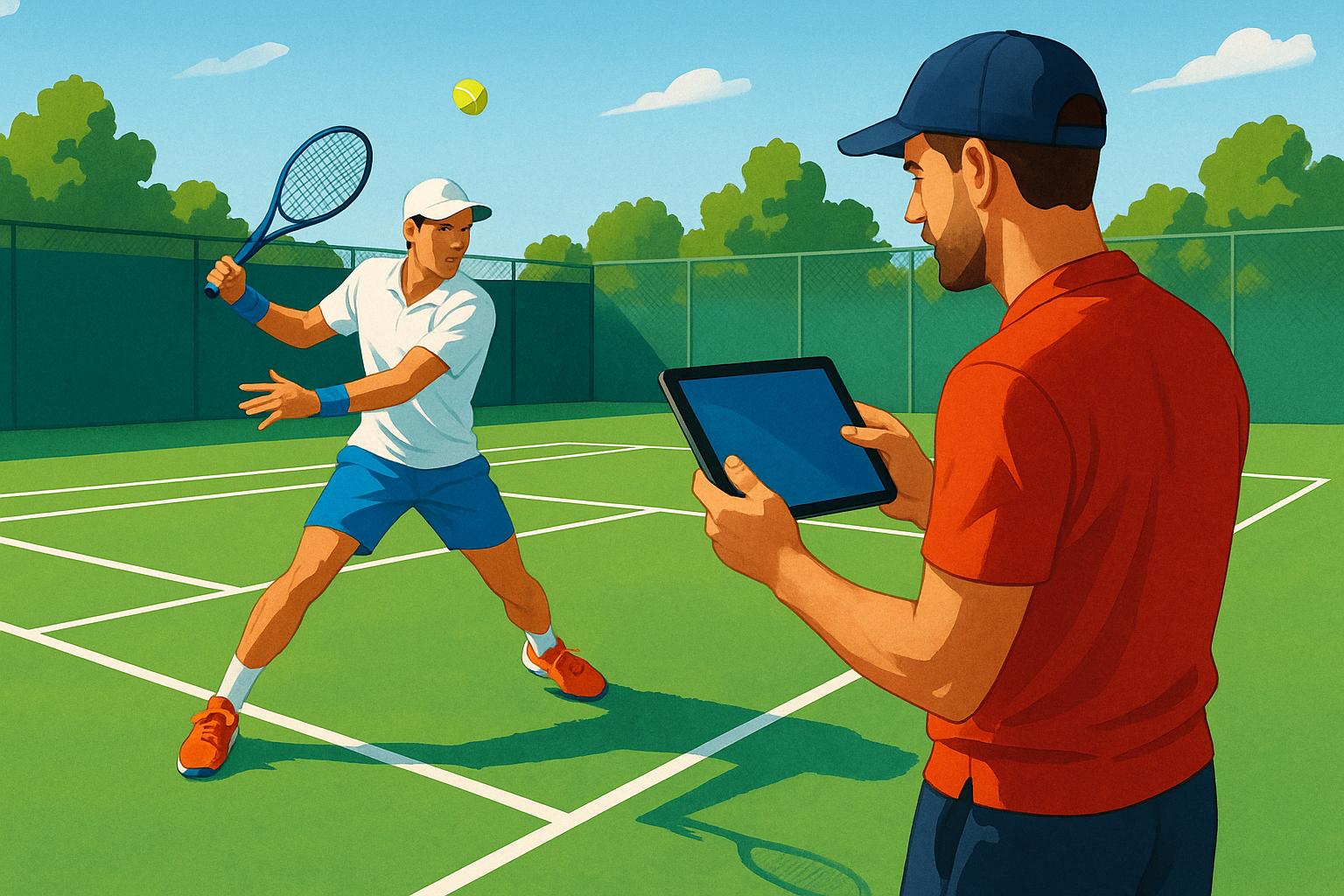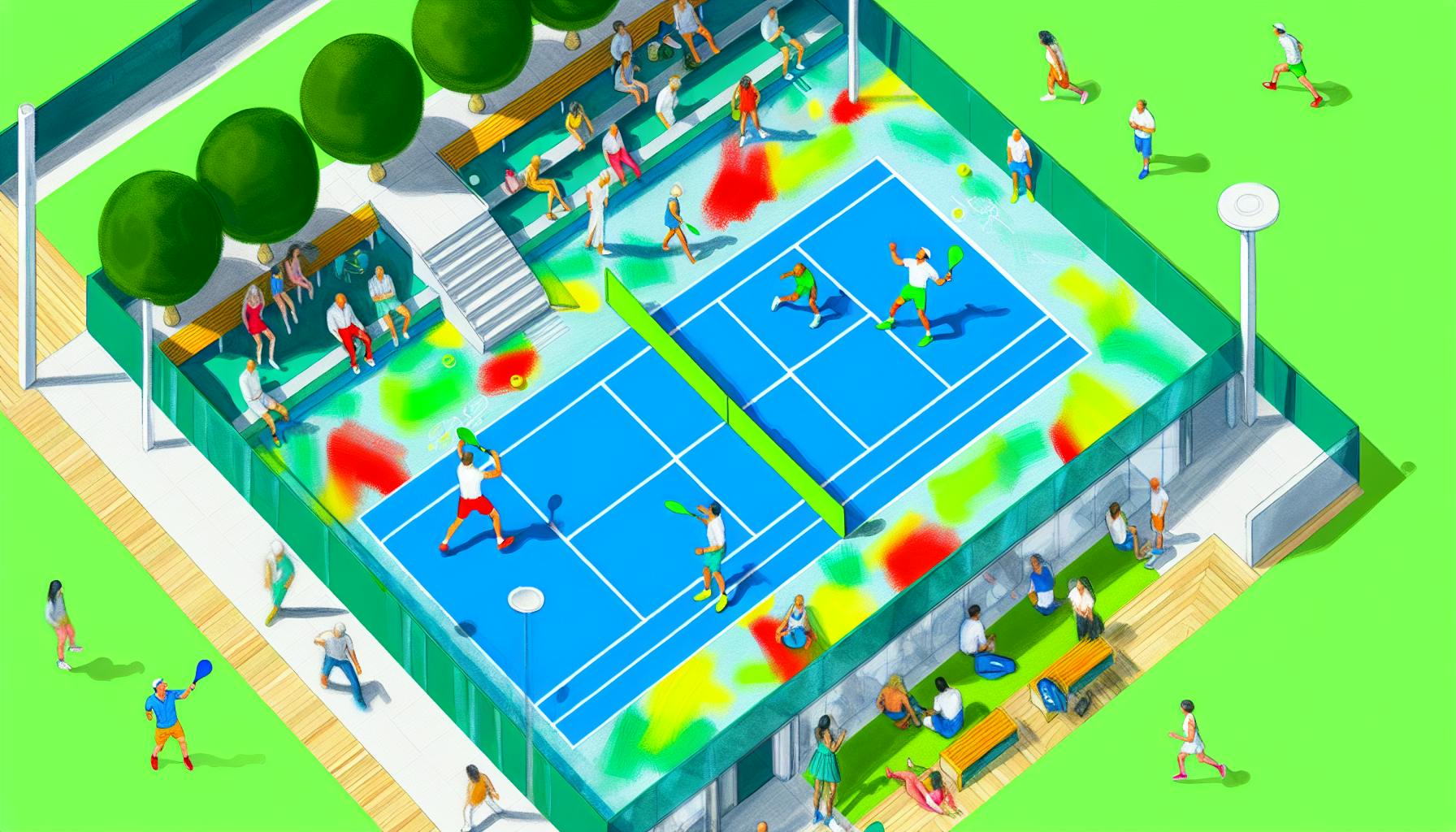When deciding between sports drinks and water for tennis, the best choice depends on match intensity, duration, and weather. Here's the breakdown:
- Sports Drinks: Ideal for long, high-intensity matches or hot weather. They replace lost electrolytes, provide carbohydrates for energy, and aid recovery. Perfect for matches over 90 minutes or when sweating heavily.
- Water: Best for short sessions, casual play, or cooler conditions. It hydrates without added calories or sugars, making it suitable for light activity or everyday hydration.
Quick Comparison
| Factor | Sports Drinks | Water |
|---|---|---|
| Hydration Efficiency | Replenishes fluids and electrolytes effectively | Basic hydration |
| Energy Support | Provides carbohydrates for sustained energy | No energy boost |
| Electrolyte Replacement | Replaces sodium, potassium, and magnesium | Does not replace electrolytes |
| Cost | Higher due to added ingredients | Lower |
| Calories | Contains calories from sugars | Calorie-free |
| Best For | Long matches, hot weather, intense activity | Short sessions, casual games |
For long matches or hot conditions, sports drinks keep you energized and hydrated. For everyday play or light workouts, water is all you need. Tailor your choice to match your activity level and environment.
Water vs Sports Drinks: Which Hydrates Athletes Better? 💧
Hydration: How Sports Drinks and Water Compare
Tennis matches can drain your body of both water and electrolytes, making hydration a critical factor for performance and recovery. Choosing the right drink can make all the difference.
Electrolytes and Fluid Retention
Staying hydrated isn’t just about drinking water - it’s also about replenishing electrolytes. During intense matches, your body loses essential minerals like sodium, potassium, and chloride through sweat. These electrolytes are crucial for helping your body absorb and retain fluids. Sports drinks are specifically designed to replace these losses. Sodium, for instance, improves water absorption and helps your body hold onto fluids, while potassium supports proper muscle function and helps ward off cramps.
Research on Rehydration
Studies suggest that beverages containing a balance of electrolytes and carbohydrates are more effective at enhancing fluid absorption and retention during extended periods of activity.
For shorter or less intense sessions, water is often sufficient to keep you hydrated. However, during longer, high-intensity matches, sports drinks shine by helping to maintain electrolyte levels and prevent dehydration. Choosing between water and a sports drink should depend on the duration and intensity of your match.
Energy and Endurance: Carbohydrates in Sports Drinks
When it comes to grueling tennis matches, staying hydrated is only part of the equation. Maintaining energy levels is just as important, especially as matches drag on and your body burns through its reserves. This is where the carbohydrates in sports drinks shine - they provide a quick energy boost that plain water simply can't offer.
Fighting Fatigue During Matches
Long matches can drain your glycogen stores, which are your muscles' primary energy source. Carbohydrates in sports drinks help replenish these stores, fueling both your muscles and nervous system to keep you going strong [1]. By supplying this much-needed energy mid-match, sports drinks help sustain your endurance when your natural reserves begin to dip. This makes them a valuable ally against fatigue.
Why Water Falls Short for Energy
While water is great for hydration, it doesn’t provide the energy your body needs during prolonged physical activity. Without a source of carbohydrates to maintain blood glucose levels, extended play can leave you feeling drained and compromise your performance. Sports drinks fill this gap, offering both hydration and the energy boost essential for staying competitive.
Recovery After Tennis: Electrolytes and Muscle Repair
After an intense tennis match, your body craves the right nutrients to bounce back. This recovery phase is where the choice between sports drinks and plain water becomes crucial. It's not just about hydration - it's about replenishing lost nutrients and supporting muscle repair.
Replacing Lost Electrolytes
Hydration is only part of the equation; your body also needs to replace the electrolytes lost through sweat. During a high-energy match, you lose sodium, potassium, and magnesium, all of which play key roles in keeping your muscles and nerves functioning smoothly. Without them, you’re more prone to cramps and fatigue that can derail your performance.
Sports drinks are specifically designed to help with this. Sodium not only aids in fluid retention but also supports muscle function, while potassium helps maintain steady heart rhythms and proper muscle contractions. To maximize recovery, aim to replenish these electrolytes within the first 30 to 60 minutes after your match. This sets the foundation for muscle repair, which is where protein-enhanced recovery drinks come into play.
Protein Sports Drinks for Muscle Recovery
Protein-packed sports drinks take recovery a step further by combining electrolytes with the muscle-repairing benefits of protein.
The repetitive, high-intensity movements in tennis often cause tiny tears in your muscles. Proteins like whey and casein, commonly found in these drinks, supply the amino acids needed to repair and rebuild those muscle fibers. For the best results, consume protein within two hours of finishing your match.
Many recovery drinks are formulated with a 3:1 or 4:1 carbohydrate-to-protein ratio, offering a double advantage. The carbohydrates help restore glycogen levels, while the protein focuses on repairing muscles. Some drinks even include branched-chain amino acids (BCAAs), which may further reduce muscle damage and speed up recovery, so you’re ready to hit the court again sooner.
sbb-itb-5591e69
Sports Drinks vs. Water: Side-by-Side Comparison
Here's a quick look at how sports drinks and water stack up when it comes to hydration and recovery:
| Factor | Sports Drinks | Water |
|---|---|---|
| Hydration Efficiency | Designed with added electrolytes for faster absorption | Provides basic hydration |
| Electrolyte Replacement | Packed with electrolytes to replace those lost through sweat | Does not replace electrolytes |
| Energy Support | Contains carbohydrates for an energy boost during long or intense activity | Hydrates without adding energy or calories |
| Cost | More expensive due to added ingredients | Generally less expensive |
| Calories | Includes calories from carbohydrates | Calorie-free |
| Recovery Benefits | Helps with muscle recovery by replenishing glycogen | Focuses solely on rehydration |
| Best For | Long matches, hot weather, or intense physical activity | Short sessions, casual play, or daily hydration |
| Taste | Flavored options make it more appealing during play | Neutral taste that some may find plain |
Sports drinks are a go-to option for extended play or intense conditions, offering hydration, energy, and electrolyte replenishment. On the other hand, water is perfect for shorter sessions, casual games, or everyday hydration needs.
If you're playing a long match in the heat, sports drinks can help maintain energy levels and replace lost electrolytes. But for lighter activities or quick games, water does the job without added calories or cost. The right choice depends on how long and hard you're playing.
When to Use Sports Drinks vs. Water
Choosing between sports drinks and water can make a big difference in how your body performs and recovers. The right choice depends on the intensity of your activity, the duration, and environmental conditions.
Best Times for Sports Drinks
Sports drinks shine during high-intensity activities or when you’re playing in tough conditions. For matches lasting over 90 minutes - especially during tournaments with back-to-back games - sports drinks provide the carbohydrates your body needs to replenish glycogen stores.
In hot and humid weather, particularly when temperatures climb above 80°F, sports drinks are a must. Sweating intensifies in these conditions, and if you’re playing on outdoor courts, the heat radiating from the surface adds even more stress. The electrolytes and carbs in sports drinks help replace what you lose and keep your energy steady.
High-intensity training sessions, like prolonged drills or conditioning workouts, also call for sports drinks. These sessions demand more energy, and the quick-absorbing carbs in sports drinks can prevent that dreaded energy crash mid-session.
When Water Works Fine
For less demanding scenarios, water is all you need. Casual matches under an hour don’t require the extra calories or electrolytes found in sports drinks. Your body’s energy stores are more than capable of supporting shorter play sessions without additional supplementation.
Cooler weather, where temperatures stay below 70°F, also reduces your need for sports drinks. With a lower sweat rate, plain water is enough to keep you hydrated.
Light practice sessions, like working on technique, easy rallying, or short drills, don’t deplete your energy stores the way competitive play does. Water is perfectly suited for these activities, keeping you hydrated without adding unnecessary sugars or calories.
For daily hydration between matches or training, stick with water. There’s no need for the added sugars and electrolytes in sports drinks when you’re simply maintaining your baseline hydration.
Creating Your Own Hydration Plan
Use these guidelines to create a hydration strategy tailored to your needs. One way to monitor your hydration is by weighing yourself before and after practice. For every pound lost, aim to drink 16-24 ounces of fluid. Pay attention to your energy levels - if you find yourself feeling drained during the second set of matches, incorporating sports drinks might help sustain your performance.
Consider your schedule, too. Tournament days with multiple matches require a different approach than a single practice session. Check the weather forecast and heat index before heading to the court, and bring sports drinks if the conditions are challenging.
Start hydrating with water 2-3 hours before you play. During longer or more intense sessions, switch to sports drinks to maintain energy and replace lost electrolytes. After high-intensity sessions, sports drinks can help restore glycogen levels and aid muscle recovery. For lighter activities, stick to water - it’s all you need to stay hydrated without extra calories.
Conclusion: Picking the Right Hydration Choice
Your hydration strategy should align with the demands of your match. For long, high-intensity sessions - especially in the heat - sports drinks provide the extra energy and electrolytes your body needs. On the other hand, for shorter or less intense play, water is a simple and effective option that avoids unnecessary calories.
If you notice your energy waning during a grueling match, incorporating a sports drink can help sustain your performance. However, if water alone keeps you energized during lighter sessions, it’s perfectly fine to stick with it. Be prepared to adjust your hydration mid-match based on how you’re feeling, as discussed earlier.
Hydration isn’t one-size-fits-all. Factors like the season, your fitness level, and your match schedule all play a role. The key is to stay flexible and fine-tune your approach based on your experiences on the court. By doing so, you’ll stay hydrated and ready to bring your best game every time.
FAQs
Should I drink water or a sports drink while playing tennis, especially in different weather conditions?
When you're playing tennis in hot and sticky weather - think temperatures above 80°F - a sports drink packed with electrolytes is your best friend. It helps you stay hydrated while replacing the minerals you lose through sweat. A good rule of thumb? Drink about 14–16 ounces during each changeover to keep dehydration and overheating at bay.
On cooler or milder days, plain water often does the trick, especially for shorter matches. However, if you're playing for a longer stretch, you might want to mix in a sports drink to maintain your energy. For moderate weather, aim to sip around 7–8 ounces every 15 minutes to stay on top of your hydration game.
Sports drinks shine during intense matches under extreme heat, while water is usually enough for less demanding sessions or cooler conditions. Keep your hydration strategy flexible based on the weather and the intensity of your game!
What are the advantages of drinking protein-enriched sports drinks after playing tennis?
Protein-packed sports drinks play a key role in speeding up muscle recovery after a tennis match. By delivering essential amino acids, they help repair and rebuild muscle fibers, ease soreness, and restore energy levels more efficiently. To maximize their benefits, it’s best to consume these drinks within 20 minutes of finishing your exercise.
Beyond recovery, these drinks also help replace nutrients lost during intense physical activity. This makes them a practical choice for tennis players looking to recover quickly and get back on the court feeling refreshed.
Is it a good idea to mix sports drinks and water during a tennis match?
Yes, combining sports drinks with water during a tennis match can help you stay hydrated and maintain energy levels. Sports drinks supply electrolytes and carbohydrates to replace what you lose through sweat, while water hydrates you without adding unnecessary sugars or calories.
Some players prefer to dilute sports drinks with water to avoid consuming too much sugar or electrolytes, especially in long or grueling matches. However, it's important to strike the right balance - going overboard with either can cause digestive issues or throw off your electrolyte levels. Try experimenting during practice sessions to figure out what works best for your body.


